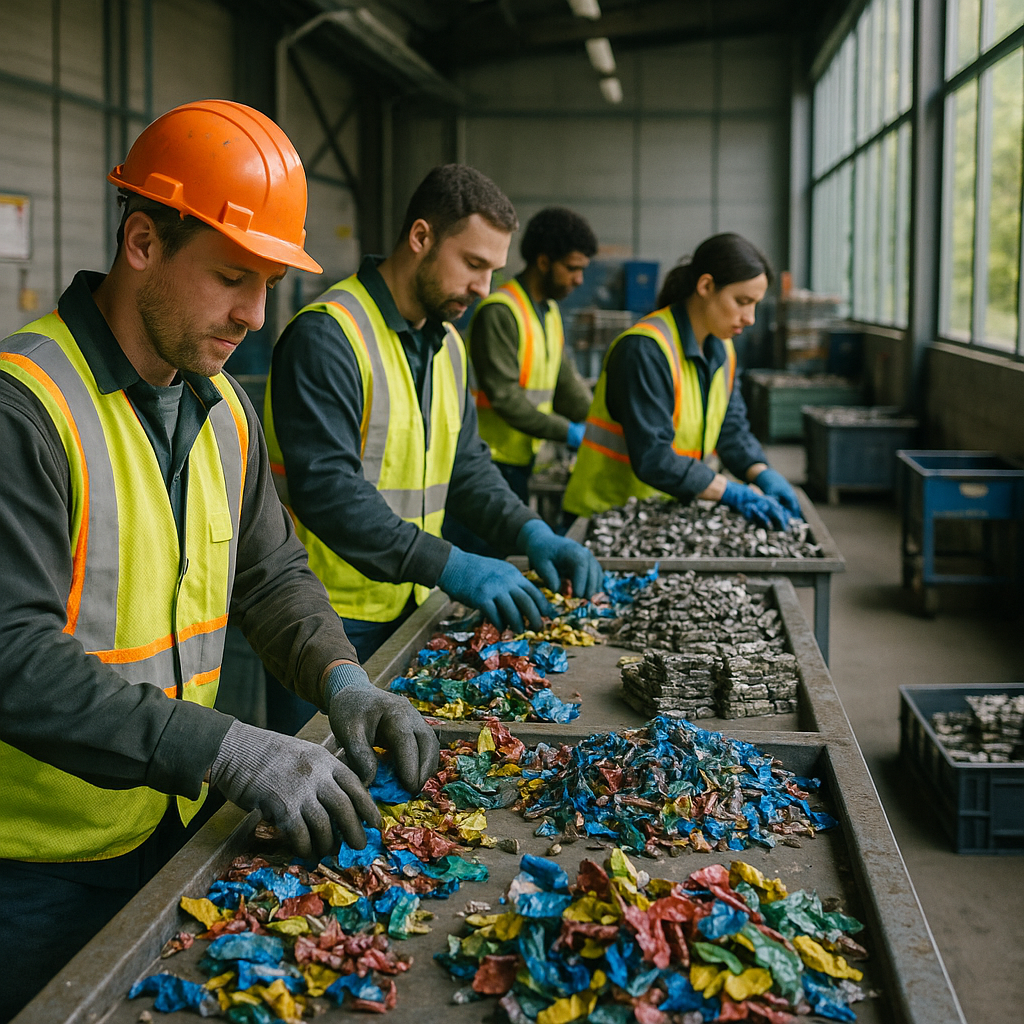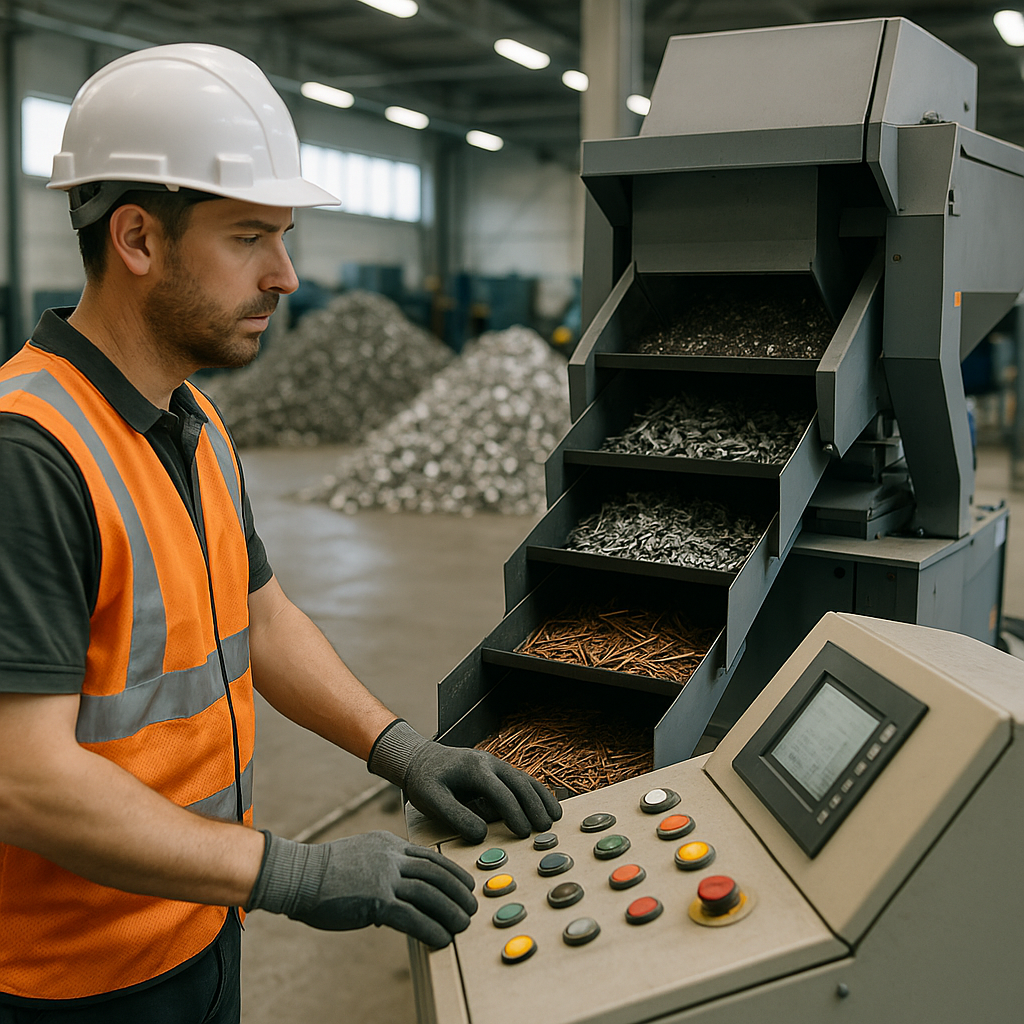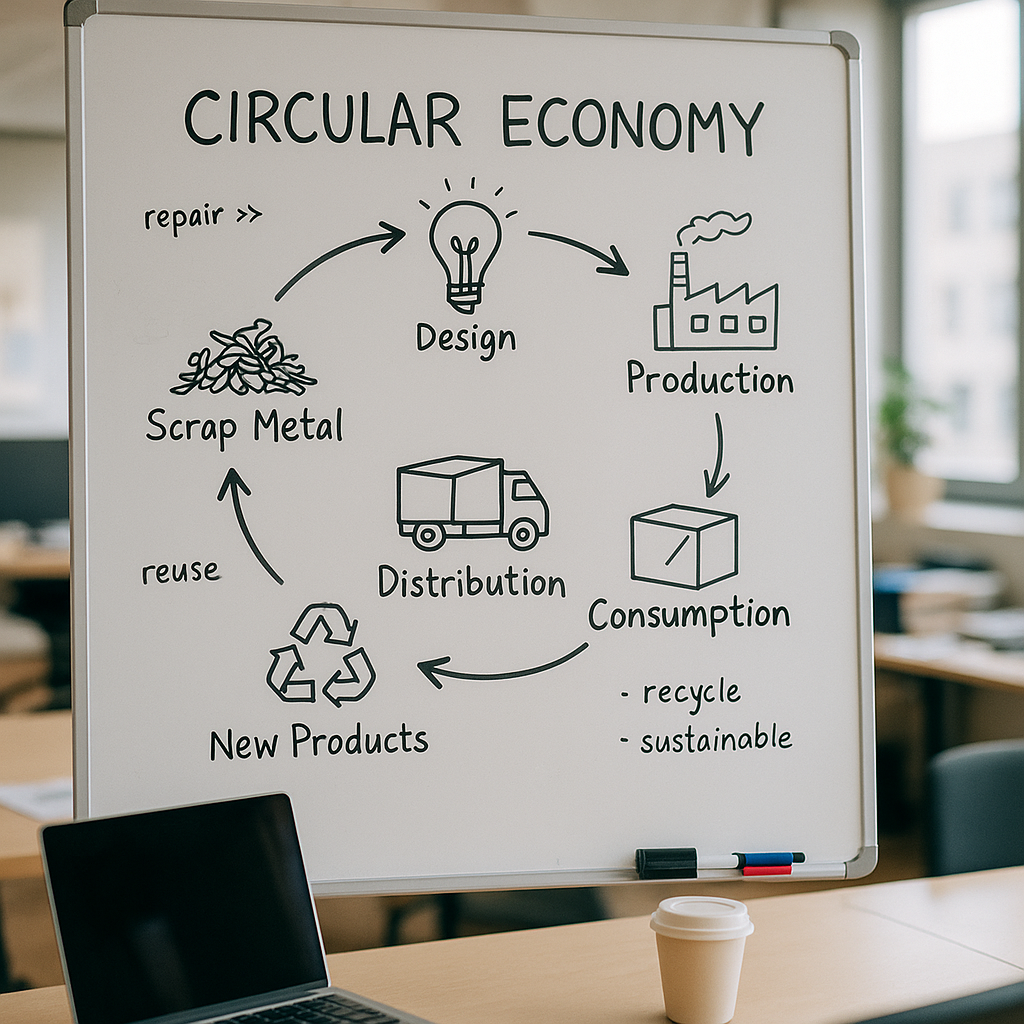5901 Botham Jean Blvd, Dallas, TX 75215
What is Eco-friendly Scrap Metal Collection?
June 4, 2025Eco-friendly scrap metal collection is a crucial environmental practice where discarded metal materials are gathered and processed with sustainability as the main goal. Unlike traditional methods that deplete natural resources, this approach focuses on reducing the ecological impact of metal usage.
The concept is straightforward yet impactful: instead of extracting new metals through mining, we collect and repurpose existing metals that might otherwise end up in landfills. This practice significantly cuts down the energy needed to produce metal products. According to the Environmental Protection Agency, recycling aluminum cans saves 95% of the energy required to make the same amount from raw materials.
Metal recycling is distinct from other recycling efforts because of its exceptional efficiency. Unlike plastic or glass, metals can be recycled repeatedly without losing quality. This makes scrap metal collection one of the most effective ways to combat resource depletion in our increasingly metal-dependent world.
How Does Eco-friendly Scrap Metal Collection Benefit the Environment?

Eco-friendly scrap metal collection offers significant environmental benefits by altering how we source and process metals. Recycling metals instead of mining virgin ore helps conserve finite natural resources that would otherwise be depleted through extensive mining.
Resource conservation is a major advantage. Recycling one ton of steel saves around 2,500 pounds of iron ore. The Earth has limited metal ore, and excessive mining harms natural landscapes and ecosystems.
The energy savings from scrap metal recycling are substantial. Processing recycled aluminum uses up to 92% less energy than producing new aluminum from raw materials. This significant reduction in energy consumption leads to fewer greenhouse gas emissions and a smaller carbon footprint.
Pollution reduction occurs at various levels through scrap metal recycling. By reducing the need for mining, we avoid soil contamination, water pollution, and habitat destruction associated with extraction. Mining releases harmful chemicals and sediment into waterways and disrupts large land areas.
Landfill waste reduction is another clear benefit. Metals don’t biodegrade and can remain in landfills for centuries. Recycling programs divert these materials, freeing up valuable landfill space and preventing potential soil and water contamination from metal waste.
The circular economy benefits of metal recycling go beyond immediate environmental impacts. Scrap metal can be recycled repeatedly without degrading quality, creating a sustainable cycle of use and reuse that breaks the traditional take-make-dispose pattern of resource consumption.
Greenhouse gas emission reductions from scrap metal recycling help combat climate change. The decreased energy requirements and reduced mining operations significantly lower the carbon emissions associated with metal production and processing.
What Are the Key Techniques in Eco-friendly Scrap Metal Processing?

De-pollution is the cornerstone of eco-friendly scrap metal processing. This crucial first step involves removing hazardous materials from metal waste before it enters the recycling stream. The process prevents harmful substances from contaminating soil, water, and air during later recycling stages. Without proper de-pollution, recycling operations risk releasing toxins that could harm both the environment and human health.
Specialized de-pollution equipment is essential for safely managing potentially dangerous materials. Technicians use purpose-built drainage systems to extract fluids from vehicles and appliances. These systems capture oils, coolants, transmission fluids, and refrigerants that would otherwise leak into the environment. The captured fluids are then contained in sealed vessels for proper disposal or recycling through separate specialized channels.
Advanced inspection protocols ensure no hazardous materials remain in the metal stream. Workers use both visual assessments and specialized detection equipment to identify contaminants. Mercury switches from automobiles, lead-acid batteries, and electronic components containing heavy metals all require careful removal. These items follow separate processing paths designed specifically for their unique hazards.
Purification technologies further enhance the environmental benefits of metal recycling. After initial de-pollution, the remaining metal undergoes processes to remove residual contaminants. Magnetic separation efficiently divides ferrous from non-ferrous metals. Shredding and sorting equipment then prepares the material for melting, with each metal type requiring different furnace settings and processing techniques.
Environmental compliance standards govern every step of eco-friendly scrap metal processing. Facilities must maintain detailed records of hazardous material handling and disposal. Regular testing ensures that emissions and waste products meet strict regulatory requirements. Companies that exceed these standards often gain competitive advantages through green certifications and improved customer trust.
Continuous innovation drives improvements in contamination prevention. New technologies like electrolysis help achieve higher purity levels in recycled metals. More effective detection systems identify even trace contaminants that older methods might miss. These advances make recycled metal increasingly comparable to virgin material in quality while maintaining superior environmental benefits.
Worker training is another crucial component of effective de-pollution programs. Staff must understand proper handling procedures for each hazardous material they encounter. Safety protocols protect both workers and the environment from accidental exposure. Regular training updates ensure teams stay current with evolving best practices and regulatory changes in the industry.
How Does Eco-friendly Scrap Metal Collection Support the Circular Economy?

Eco-friendly scrap metal collection is a cornerstone of the circular economy. This model aims to eliminate waste and maximize resource value by keeping materials in use for as long as possible. Unlike the linear economy’s take-make-dispose approach, the circular economy focuses on resource preservation and reuse.
Metals are ideal for circular economy principles because they can be recycled repeatedly without losing their essential qualities. Steel, aluminum, copper, and other metals maintain their integrity through multiple recycling cycles, allowing them to be reintroduced into manufacturing processes indefinitely.
When scrap metal is collected and properly processed, it reduces the need to extract virgin materials through mining, creating a significant environmental benefit. Mining operations often cause habitat destruction, soil erosion, and water contamination. By recycling one ton of steel, approximately 2,500 pounds of iron ore, 1,400 pounds of coal, and 120 pounds of limestone are conserved.
The energy savings from eco-friendly scrap collection are equally impressive. Recycling aluminum uses 95% less energy than producing it from raw bauxite ore. Steel recycling saves about 60% of the energy required for virgin production. These energy reductions lead to lower carbon emissions and reduced climate impact.
Scrap metal collection also minimizes waste accumulation in landfills. Metals take hundreds or thousands of years to decompose naturally. When recycled, they avoid occupying valuable landfill space and prevent potential leaching of harmful substances into soil and groundwater. This waste reduction is central to circular economy principles.
The economic benefits extend beyond resource conservation. The scrap metal recycling industry creates jobs in collection, sorting, processing, and manufacturing. It also helps stabilize metal prices by providing a reliable secondary source of materials, making industries less vulnerable to supply disruptions or price volatility in raw material markets.
Local economies benefit directly from scrap metal collection systems. Community-based recycling programs keep resources circulating within regional markets, reducing transportation emissions and supporting local businesses. This localized approach strengthens economic sustainability while reducing environmental impact.
The circular economy model supported by scrap metal recycling also drives innovation. As businesses seek more efficient ways to use recycled materials, they develop new technologies and processes. These innovations often lead to better product designs that consider end-of-life recycling from the start, further enhancing circularity.
What Economic Benefits Does Eco-friendly Scrap Metal Collection Offer?
Eco-friendly scrap metal collection drives substantial economic growth while supporting environmental sustainability. The recycling industry employs over 500,000 people in the United States alone, with jobs spanning collection, sorting, processing, and manufacturing. This workforce continues to expand at a steady rate of approximately 8% annually, reflecting the increasing demand for recycled metals across various sectors.
The Institute of Scrap Recycling Industries (ISRI) reports that the U.S. scrap recycling industry supported about 534,000 jobs in 2019. These employment opportunities range from entry-level positions to specialized technical roles requiring advanced skills. In smaller communities, recycling facilities often serve as significant employers and economic anchors.
From a business perspective, using recycled metals offers notable cost advantages. Manufacturing with recycled materials eliminates the need for expensive raw material extraction, lowering production expenses. This cost-effectiveness makes products more affordable for consumers while maintaining profit margins for businesses. Many companies have recognized these financial benefits and incorporated recycled metals into their manufacturing processes.
The economic impact extends beyond direct employment. The scrap metal recycling industry generates billions of dollars annually through various channels. Local economies benefit from increased spending, tax revenue, and reduced dependence on imported virgin materials. This strengthens domestic economies and improves resource security by utilizing materials already within national borders.
For individuals, scrap metal recycling presents a tangible financial opportunity. By selling discarded metal items to recycling facilities, people can generate income from materials that would otherwise become waste. Many facilities pay cash for various metals including steel, aluminum, copper, and brass. The value varies based on metal type, quality, and market conditions but consistently offers a practical way to earn money while supporting sustainability efforts.
The economic advantages of eco-friendly scrap metal collection strengthen local communities through job creation, business cost savings, and individual revenue opportunities. These economic benefits work alongside the environmental advantages, creating a truly sustainable industry with positive impacts across multiple dimensions.
Conclusion: Embracing Eco-friendly Scrap Metal Collection for a Sustainable Future
Eco-friendly scrap metal collection represents a significant intersection of environmental stewardship and economic opportunity. Throughout this article, we’ve examined how this practice conserves valuable resources, reduces energy consumption, and minimizes pollution across ecosystems. By diverting metals from landfills and reintroducing them into production cycles, we foster a circular economy that benefits our planet in multiple ways.
The economic advantages are equally compelling. Scrap metal recycling generates substantial job opportunities, stimulates local economies, and offers cost-effective alternatives for businesses and manufacturers. The industry’s contribution of billions in economic activity shows that environmental responsibility and financial prosperity can effectively work together.
Ready to contribute to your community’s sustainability efforts? Contact Okon Recycling at 214-717-4083 for expert guidance on responsible metal recycling solutions. Our team is committed to helping you transform discarded metals into valuable resources for a greener, more sustainable future.
